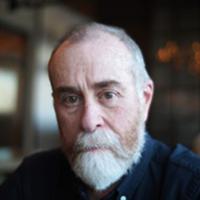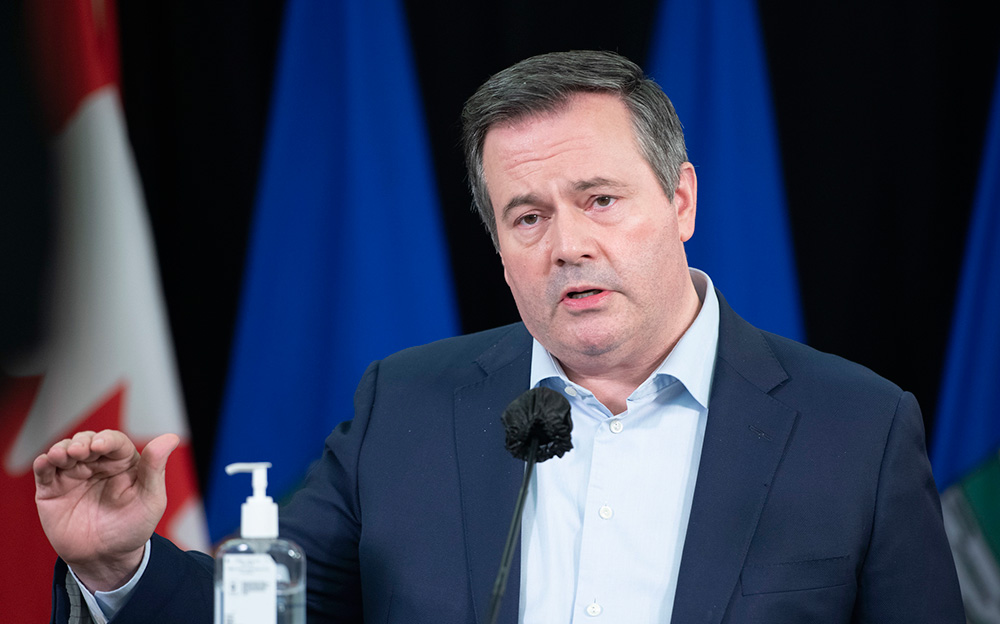Brace yourselves, Alberta, for a hard circuit-breaker lockdown to rein in the province’s surging, out-of-control COVID-19 infection rate.
We can be reasonably certain this is coming soon, because Premier Jason Kenney informed us Sunday that there’s no way it’s going to happen.
Kenney took to the airwaves to respond to calls for a “firebreak” lockdown to counter the collapse of the province’s health-care system, including a weekend open letter from the province’s former chief medical officer of health and a critical care physician.
In the letter, James Talbot and Noel Gibney urged newly appointed Health Minister Jason Copping to close bars, gyms, casinos, indoor dining and sports facilities for at least four weeks.
University of Alberta economist Andrew Leach tweeted that Kenney had “rejected the possibility of a fourth wave, and previously rejected calls for more stringent measures during the second and third waves. He rejected calls for a vaccine passport. He rejected calls to replace Shandro” — that is, his former Health Minister Tyler Shandro, who is now the labour minister.
So, Leach concluded, “Kenney rejecting something is a sure sign that it’s coming.”
Mostly AWL nowadays, Kenney nevertheless joined a sympathetic right-wing Montreal talk radio host Sunday to defend his government’s response to the pandemic and blame others for the province’s heavy COVID-19 caseload and high death rate.
“I know there’s some people out there who would like to impose a hard lockdown on everyone,” Kenney told Roy Green, the 74-year-old broadcaster who is apparently the only radio commentator the premier can find nowadays who won’t ask him tough questions.
“First of all, that makes no sense for the 80 per cent of the population that’s vaccinated, who are at much lower levels of risk of transmission and extremely lower levels of risks of hospitalization,” the premier bloviated.
“But secondly, it’s the roughly 20 per cent of the adult population who are unvaccinated who are less likely to observe health measures,” he rolled along, omitting an acknowledgement that his United Conservative Party government barely tries to enforce what restrictions it imposes, or that his past statements and promises have encouraged Alberta’s aggressive vaccine refuseniks.
The premier’s gaslighting continued unabated by Green’s softball questions to explain the government’s half-hearted “proof of vaccination program,” the vaccine passport Kenney vowed would never come to Alberta, and a defence of the decision last summer to be the first province to drop almost all restrictions.
“I don’t think we were wrong to drop public health restrictions in the summer, July 1,” Kenney said. “We saw the numbers go down for five or six weeks after that. Case numbers went down very low. Hospitalizations, fewer than 100 people in hospital.
“How could I have possibly justified what the opposition and others wanted, which was continued damaging restrictions when there was no evidence to support that?”
How indeed, when experts were almost universally calling for just the actions Kenney rejected out of hand?
“We were too optimistic, but it was not just an unfounded optimism. The analysis done by our public health team of how other jurisdictions like the United Kingdom and Israel had done at similar levels of vaccination suggested that we would be able to open up and not rely on restrictions to manage the disease below the maximum capacity of our health-care service,” he blathered on.
Anyway, Kenney said, getting back to the question at hand about a circuit-breaker lockdown, “in the case of Alberta, our perspective has been that restrictions should be a last and limited resort.”
That statement, at least, is accurate. Indeed, Kenney’s reluctance to impose tough restrictions, and his government’s consistent hurry to drop them, is almost certainly the reason things are as bad as they are now.
Since Kenney — as was once said of the House of Bourbon — learns nothing and forgets nothing, a hard lockdown now seems all but inevitable.
Too bad that whatever action Kenney takes is almost certain to be too late — a hallmark of UCP mismanagement from the start of the pandemic — to save many lives and perhaps even to rescue the province’s crumbling health-care system.
As of Friday, Canadian government statistics showed Alberta, with about one-eighth of the country’s population, with the highest count of active COVID cases among all Canadian provinces and territories by a significant margin — 20,040 cases compared with 6,478 in Quebec, the next highest provincial caseload.
Quebec has almost double Alberta’s population.
Similarly, the COVID death rate per 100,000 people in Alberta in the previous two weeks led the country dramatically, three times higher than that of B.C., almost six times higher than Ontario’s rate, nearly seven times that of Quebec, and 40 times that of Nova Scotia.
And almost all surgeries have been cancelled in Alberta and triaging of patients who require care from the province’s jam-packed intensive-care units to survive has begun in some places and looms elsewhere. ![]()
Read more: Politics, Coronavirus
















Tyee Commenting Guidelines
Comments that violate guidelines risk being deleted, and violations may result in a temporary or permanent user ban. Maintain the spirit of good conversation to stay in the discussion.
*Please note The Tyee is not a forum for spreading misinformation about COVID-19, denying its existence or minimizing its risk to public health.
Do:
Do not: